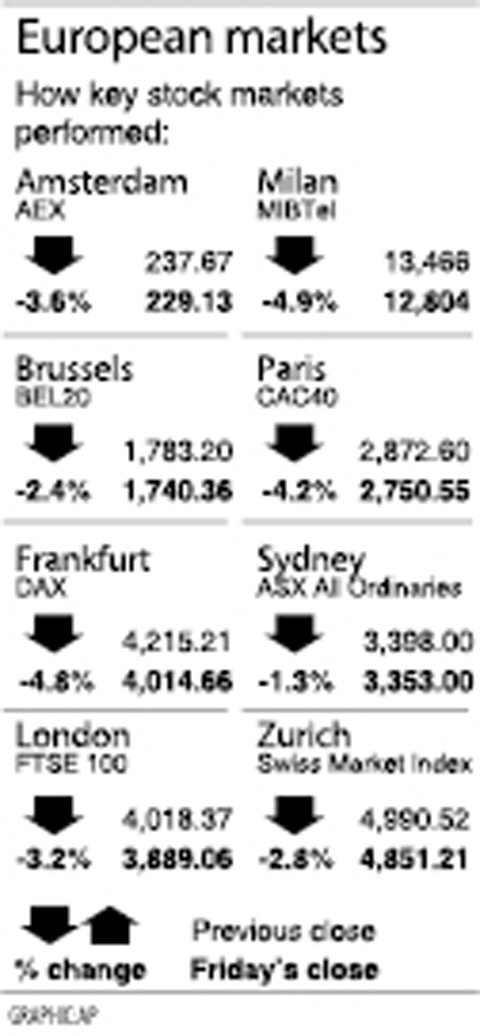European stocks posted the biggest weekly drop in two months, sending the Dow Jones STOXX 600 Index to the lowest level since March 2003, as concern grew the economy would deteriorate further and companies from Daimler AG to Cie de Saint-Gobain SA reported disappointing earnings.
Swedbank AB and UniCredit SpA led a sell-off in financial shares after Moody’s Investors Service said it may downgrade banks with units in eastern Europe. Axa SA tumbled 30 percent as Standard & Poor’s cut its credit outlook for the insurer. Daimler, the largest truckmaker, and Saint-Gobain, Europe’s biggest supplier of building materials, sank at least 15 percent.
The STOXX 600 dropped 7.5 percent this week to 176.93 as all 19 industry groups retreated except food and beverage companies.

The gauge is down 11 percent this year as companies from Electricite de France SA to Diageo PLC fueled concern the global economic slump will wipe out profits and US Treasury Secretary Timothy Geithner failed to convince investors that his plan to rescue US banks will work.
“It was a very disillusioning week, especially the uncertainty over exposure to eastern Europe,” said Peter Braendle, who manages US$50 billion at Swisscanto Asset Management in Zurich. “We are on very low levels and there are still a lot of uncertainties surrounding the financial industry.”
The UK’s GDP will decrease 3.3 percent this year, instead of the 1.7 percent predicted in November, the Confederation of British Industry said. By the end of this year, the economy will have contracted for six consecutive quarters, the business lobby said.
National benchmark indexes fell in all of the 18 western European markets. Germany’s DAX Index dropped 9 percent, while France’s CAC 40 declined 8.3 percent. The UK’s FTSE 100 lost 7.2 percent as Anglo American PLC and Xstrata PLC slid.

MORE VISITORS: The Tourism Administration said that it is seeing positive prospects in its efforts to expand the tourism market in North America and Europe Taiwan has been ranked as the cheapest place in the world to travel to this year, based on a list recommended by NerdWallet. The San Francisco-based personal finance company said that Taiwan topped the list of 16 nations it chose for budget travelers because US tourists do not need visas and travelers can easily have a good meal for less than US$10. A bus ride in Taipei costs just under US$0.50, while subway rides start at US$0.60, the firm said, adding that public transportation in Taiwan is easy to navigate. The firm also called Taiwan a “food lover’s paradise,” citing inexpensive breakfast stalls

TRADE: A mandatory declaration of origin for manufactured goods bound for the US is to take effect on May 7 to block China from exploiting Taiwan’s trade channels All products manufactured in Taiwan and exported to the US must include a signed declaration of origin starting on May 7, the Bureau of Foreign Trade announced yesterday. US President Donald Trump on April 2 imposed a 32 percent tariff on imports from Taiwan, but one week later announced a 90-day pause on its implementation. However, a universal 10 percent tariff was immediately applied to most imports from around the world. On April 12, the Trump administration further exempted computers, smartphones and semiconductors from the new tariffs. In response, President William Lai’s (賴清德) administration has introduced a series of countermeasures to support affected

CROSS-STRAIT: The vast majority of Taiwanese support maintaining the ‘status quo,’ while concern is rising about Beijing’s influence operations More than eight out of 10 Taiwanese reject Beijing’s “one country, two systems” framework for cross-strait relations, according to a survey released by the Mainland Affairs Council (MAC) on Thursday. The MAC’s latest quarterly survey found that 84.4 percent of respondents opposed Beijing’s “one country, two systems” formula for handling cross-strait relations — a figure consistent with past polling. Over the past three years, opposition to the framework has remained high, ranging from a low of 83.6 percent in April 2023 to a peak of 89.6 percent in April last year. In the most recent poll, 82.5 percent also rejected China’s

PLUGGING HOLES: The amendments would bring the legislation in line with systems found in other countries such as Japan and the US, Legislator Chen Kuan-ting said Democratic Progressive Party (DPP) Legislator Chen Kuan-ting (陳冠廷) has proposed amending national security legislation amid a spate of espionage cases. Potential gaps in security vetting procedures for personnel with access to sensitive information prompted him to propose the amendments, which would introduce changes to Article 14 of the Classified National Security Information Protection Act (國家機密保護法), Chen said yesterday. The proposal, which aims to enhance interagency vetting procedures and reduce the risk of classified information leaks, would establish a comprehensive security clearance system in Taiwan, he said. The amendment would require character and loyalty checks for civil servants and intelligence personnel prior to